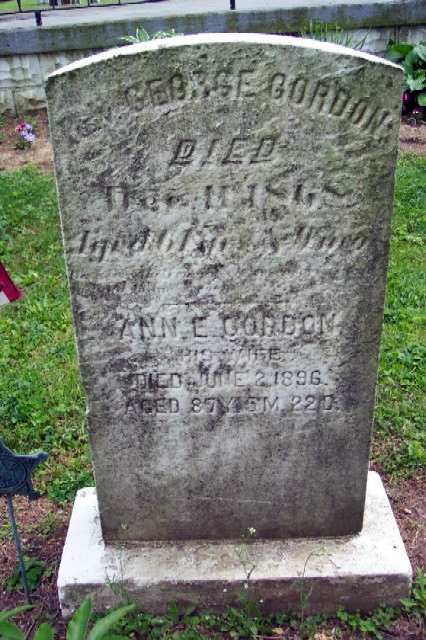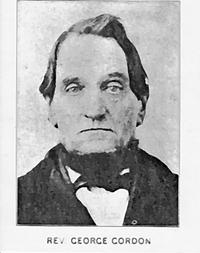

|
| Iberia Cemetery, Iberia, Morrow County, Ohio |

George graduated from Washington College in 1832, and later completed his coursework in theology at the Western Theological Seminary at Allegheny City, Pennsylvania. He then settled as pastor of the Millersburg and Hopewell Presbyterian Churches in Holmes County, Ohio, where he remained for about 8 years.
Next Reverend Gordon went to Frankfort, Beaver County, Pennsylvania to serve as pastor there. Meanwhile his brother, Joseph, who resided in Ohio, was meeting with opposition because of his anti-slavery views and expressions. Joseph withdrew from the Presbyterian Church and joined in forming the Free Presbyterian Church.
After careful consideration, Reverend Gordon returned to Ohio and transferred his membership to the Free Presbyterian Church in 1848. The Free Synod realized a need of a college and a theological institution and established the Iberia College, urging Reverend Gordon to become its first President in 1854.
In 1855, the Savannah, Ohio Free Presbyterian Church purchased the first Associate Reformed Church building, and its pastor at that time was the Reverend George Gordon, a radical advocate of anti-slavery, fearless, very popular with members of his own congregation, but greatly disliked by those of opposite ideas .
In 1860, Kentucky slaves found refuge in Iberia. After some time the slaves' whereabouts were found by their former masters who came into Iberia accompanied by US Marshals. When the citizens of Iberia became aware of what was being done, they rallied and rescued some of the slaves from the officers. Reverend Gordon approached the scene and held the officers captive, which was regarded as resisting a US officer. Eventually he gave himself up and was indicted on December 7, 1861, tried before the US Court in Cleveland, was found guilty on December 23, 1861 and was sentenced to 6 months and a fine of $500.
After Abraham Lincoln was inaugurated, friends solicited the US President for his release. After 3 month in prison, Reverend Gordon was pardoned by President Lincoln. However, he did not accept the pardon as he felt it implied guilt. But with failing health from the conditions in prison, his family and friends convinced him to accept the pardon, and he returned to Iberia.
He never regained his health, but Reverend Gordon did live long enough to see slavery abolished.
|
The George Fisher Family History is a compilation of information gathered by Eric & Liz Davis. The html
version was created by Eric and Elizabeth Fisher-Davis beginning in 2001.
Tree Outline of Fisher Generations |